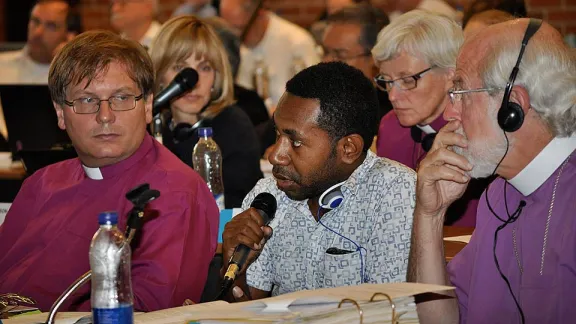
Warime Guti, Evangelical Lutheran Church of Papua New Guinea, comments during a Council 2012 plenary session © LWF/Edwin Mendivelso
Call for a Financial Transaction Tax That Supports Society’s Most Vulnerable
Council Press Release No. 11/2012 – Concluding this year’s meeting in the Colombian capital, Bogota, the Council of The Lutheran World Federation (LWF) took decisions on climate change and sustainable development.
Rio+20: Need for Clear and Forward-Looking Outcome
On the eve of the United Nations Conference on Sustainable Development in Rio de Janeiro, Brazil, 20-22 June (Rio+20) the LWF Council emphasized the need for a clear, forward-looking final document of the conference.
Council members expressed concern that the outcome document “The Future We Want”—20 years after the first summit in 1992 held in the same city—did not reflect the interests of “we the peoples” but rather those of transnational companies and the international financial system.
The governing body recalled previous LWF statements and resolutions on climate change and sustainable development and reaffirmed the principles adopted at the Earth Summit two decades ago—to promote sustainable growth that would advance social equity and protect the environment.
The Council underlined the need to include in the document a rights-based approach to development as applied by the LWF Department for World Service. It expressed support for ecumenical and interfaith partners who sought a principle-based preamble that would provide a framework for an ambitious political agenda to address care for the earth and the main challenges of several Rio conventions including issues such as desertification, biodiversity and climate change.
Financial Transaction Tax Revenues
In a further resolution the Council noted with affirmation recent proposals from Europe and the United States to establish a financial transaction tax (FTT or Tobin Tax), but strongly recommended that resulting revenues should be directed toward social, economic and environmental programs that would benefit the most vulnerable in society including indigenous persons and the poor.
The Council expressed concern that such innovative sources of revenue might not be directed “to those in greatest need, either because of the greed of unscrupulous public leaders or because of economic policies that do not support the most vulnerable people.”
Referring to the 2010 LWF Eleventh Assembly public statement “’Daily Bread’ Instead of Greed” that called for economic and climate justice, the Council urged that FTT revenue be directed toward alleviating poverty and promoting health care and education “especially on behalf of the poorest, some with a particular emphasis on the impact of climate change in these communities.”
The Council called on member churches to join the LWF in advocating for the tax with national and international decision-making bodies.
(431 words)


